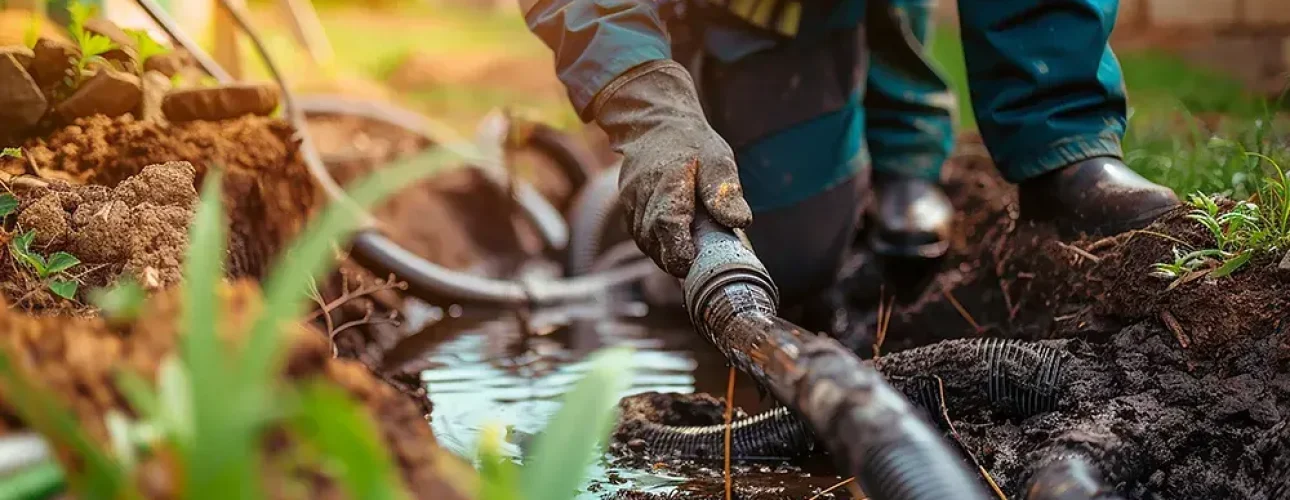Utah’s unique landscape and environmental regulations present distinct challenges for septic system engineering. At Anderson Engineering, we understand these intricacies and are committed to providing reliable, efficient, and compliant septic system solutions for our valued clients across the state.
Understanding Septic Systems
Septic systems are the workhorses of wastewater management for properties that lack access to municipal sewer lines. They play a vital role in treating household wastewater, safeguarding groundwater quality, and ensuring a healthy environment for your family and community.
What Utahns Need to Know
In Utah, septic systems are regulated by the Utah Department of Environmental Quality (DEQ) and local health departments. These regulations are designed to protect public health and the environment by ensuring that septic systems are properly designed, installed, and maintained.
Key aspects of Utah’s septic system regulations include site evaluation, design standards, permits and inspections, and maintenance requirements. A thorough site evaluation is required to determine soil type, groundwater depth, and other factors that can affect septic system design and performance. Septic systems must be designed in accordance with DEQ standards, taking into account the size of the home, number of bedrooms, and anticipated water usage.
Permits are required for septic system installation, and inspections are conducted throughout the process to ensure compliance with regulations. Regular maintenance, including pumping the septic tank and inspecting the drain field, is essential to keep the system functioning properly and prevent costly repairs or replacements.
How Septic Systems Work
Collection: It all starts with the wastewater generated in your home – from flushing toilets to washing dishes. This wastewater flows through your plumbing system and enters an underground septic tank.
Separation: The septic tank is designed to separate the solids from the liquids. Heavier solids settle to the bottom, forming a layer of sludge. Lighter materials like oils and grease float to the top, creating a layer of scum.
Partial Treatment: Inside the tank, naturally occurring bacteria begin the process of breaking down the solid waste. This is a crucial step in reducing the volume of sludge and preventing it from clogging the system.
Distribution: The partially treated wastewater, now called effluent, exits the tank and flows into a drain field or leach field. This field consists of a network of perforated pipes buried in a bed of gravel.
Final Treatment and Dispersal: As the effluent slowly seeps into the drain field, it undergoes further treatment by the soil. Soil microbes break down remaining contaminants, and the purified water eventually percolates into the groundwater.
Why Septic Systems Matter
While they might not be the most glamorous aspect of homeownership, properly functioning septic systems are unsung heroes with far-reaching benefits:
Groundwater Protection: Septic systems act as a protective barrier for our groundwater. By treating and filtering wastewater, they prevent harmful contaminants, such as bacteria, viruses, and chemicals, from seeping into the aquifer – the underground reservoir that supplies drinking water for many communities. This is especially critical in areas where groundwater is the primary source of drinking water, as contamination can have devastating consequences for public health.
Disease Prevention: Untreated wastewater is a breeding ground for harmful pathogens that can cause waterborne diseases like E. coli, salmonella, and hepatitis. Septic systems act as a first line of defense, effectively neutralizing these threats and ensuring that the wastewater released into the environment is significantly cleaner and safer. This plays a crucial role in preventing outbreaks of disease and safeguarding the well-being of your family and community.
Environmental Preservation: A healthy environment depends on clean water. Septic systems are essential for protecting the delicate balance of our ecosystems. By preventing untreated wastewater from entering streams, lakes, and other water bodies, they help maintain water quality, preserve aquatic life, and support biodiversity. This contributes to a healthier environment for everyone.
Property Value Enhancement: A well-maintained septic system is a valuable asset that can significantly impact your property’s value. Potential buyers often consider the condition of the septic system when evaluating a property. A well-functioning system provides peace of mind, knowing that the wastewater is being handled responsibly, while a neglected or failing system can be a major liability.
In essence, septic systems are not just a matter of convenience; they are a critical component of protecting our environment, safeguarding public health, and maintaining the value of our homes. By understanding their importance and taking proactive steps to maintain them, we ensure a healthier and more sustainable future for ourselves and generations to come.
Maintaining Your Septic System
To ensure your septic system functions optimally, regular maintenance is key. This includes:
- Pumping: Have your septic tank pumped every 3-5 years (or as recommended by a professional) to remove accumulated sludge and scum.
- Water Conservation: Reduce water usage to avoid overloading the system.
- Proper Waste Disposal: Avoid flushing items that can clog or damage the system, such as wipes, feminine hygiene products, and grease.
- Regular Inspections: Have your system inspected periodically by a qualified professional to identify and address any potential problems.
By understanding and properly caring for your septic system, you can protect the environment, safeguard public health, and ensure the long-term functionality of your home’s wastewater treatment system.
The Anderson Engineering Difference
At Anderson Engineering, we offer a comprehensive suite of septic system engineering services, carefully tailored to align with the unique characteristics and requirements of your property and project. Our expertise covers every stage of the septic system lifecycle, ensuring a seamless and successful experience for our clients.
Site Evaluation and Feasibility Studies
We begin by conducting a meticulous assessment of your property, evaluating soil composition, groundwater levels, topography, and other crucial factors that influence septic system design and feasibility. This in-depth analysis allows us to identify potential challenges or constraints early on, enabling us to develop customized solutions that optimize system performance and longevity.
System Design and Engineering
Our team of seasoned engineers leverages their extensive knowledge and experience to design septic systems that not only adhere to stringent DEQ standards but also maximize efficiency and minimize environmental impact. We consider factors such as household size, water usage patterns, and future expansion plans to ensure your septic system can accommodate your needs for years to come.
Permitting and Regulatory Compliance
Navigating the intricate web of permitting and regulatory requirements can be a daunting task. Our experts are well-versed in the latest regulations and have established strong relationships with local authorities. We handle the entire permitting process on your behalf, ensuring your project remains compliant and progresses smoothly.
Construction Oversight and Inspection
We understand the importance of meticulous installation to ensure the long-term functionality and reliability of your septic system. Our team provides comprehensive construction oversight, working closely with contractors to ensure adherence to design specifications and best practices. We also conduct rigorous inspections throughout the construction process to verify compliance and identify potential issues before they escalate.
Our commitment to excellence, combined with our comprehensive range of services, makes Anderson Engineering your trusted partner for all your septic system needs in Utah.
Why Choose Anderson Engineering?
- Local Expertise: We have extensive experience working with Utah’s unique soils, geology, and regulatory environment.
- Engineering Excellence: Our team of engineers is committed to delivering innovative, cost-effective, and sustainable septic system solutions.
- Client-Focused Approach: We prioritize clear communication, collaboration, and exceeding client expectations.
- Proven Track Record: We have a successful history of completing septic system projects on time and within budget.
Let Us Guide You
Navigating the complexities of septic system engineering in Utah doesn’t have to be overwhelming. At Anderson Engineering, we’re here to guide you through the process, from initial site evaluation to final inspection. Contact us today to learn more about how we can help you achieve your septic system goals.





